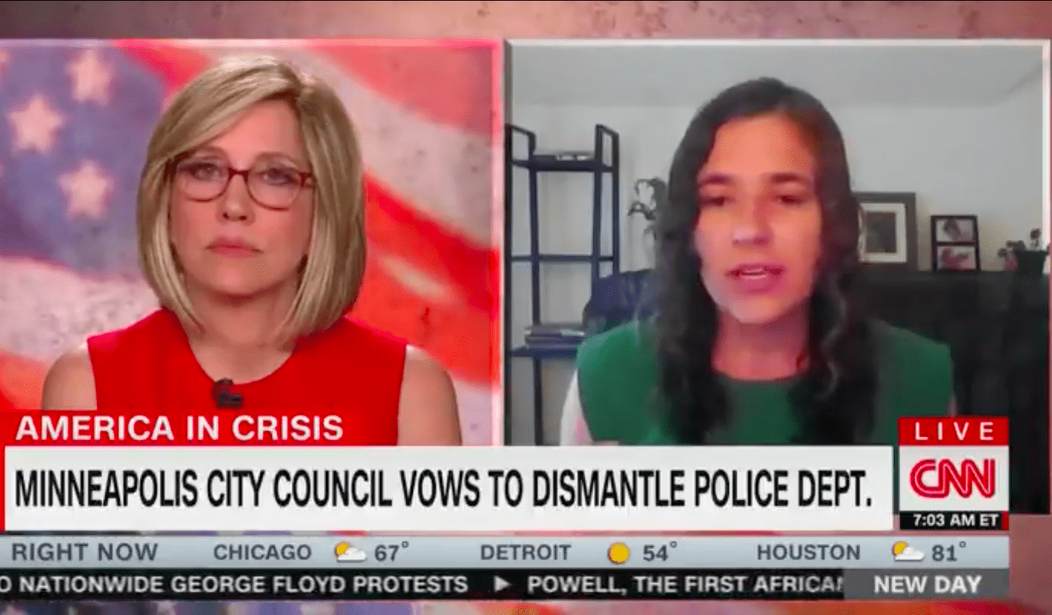If Black Lives Matter activists want to abolish the police, perhaps they should be prepared to explain who exactly will keep law and order if the police are gone. When confronted with just such a question, Minneapolis City Council President Lisa Bender not only dodged the question but also attacked the question itself as coming from “a place of privilege.”
Bender, who led the City Council in announcing that it is working on “ending the Minneapolis Police Department,” acted as though the ability to call the cops during a home invasion is a “privilege” that black people do not have.
“Do you understand that the word ‘dismantle’ or ‘police-free’ also makes some people nervous?” CNN’s Alyson Camerota asked Bender. “For instance, what if in the middle of the night my home is broken into. Who do I call?”
“Yes, I hear that loud and clear from a lot of my neighbors,” the city council president replied. “And I know — and myself, too, and I know that that [concern] comes from a place of privilege because for those of us for whom the system is working, I think we need to step back and imagine what it would feel like to already live in that reality where calling the police may mean more harm is done.”
CAMEROTA: "What if in the middle of the night my home is broken into. Who do I call?"
BENDER: "Yes, I hear that loud and clear from a lot of my neighbors. And I know — and myself, too, and I know that that comes from a place of privilege." pic.twitter.com/WhubQ9yJIf
— Eddie Zipperer (@EddieZipperer) June 8, 2020
Yes, Bender said that concerns about who will stop a burglary in the middle of the night are evidence of “privilege.” Personal safety, private property, the integrity of a person’s home is a “privilege” in her eyes.
Camerota’s question is a serious concern. The police exist to protect the lives, liberties, and properties of citizens and to enforce the law equally. While certain officers have abused that authority to kill unarmed black people like George Floyd and Breonna Taylor, that does not mean police forces need to be abolished. In both cases, the police responsible have been arrested and will face charges. Derek Chauvin, the man who knelt on George Floyd’s neck for nearly nine minutes, suffocating him, has rightly been charged with murder.
Contrary to the activist narrative, horrific deaths like theirs are rare. According to the Washington Post‘s tracker of police-involved shootings, police have killed fewer than ten unarmed black people for the last two years. In 2018 and 2019, the number of police officers killed by black assailants was actually higher.
Police reform is necessary, but abolishing or defunding the police will only create new problems — and likely harm the very people activists intend to help. It is the police’s duty to protect black citizens from home invasions just as much as it is their duty to protect citizens of other races. Contrary to Bender’s disgusting insinuation, concerns about this kind of protection do not come from “a place of privilege” — they are the fundamental response to her radical agenda.
While it appears the FBI does not report specific statistics on the race of burglary victims, black Americans are proportionately more likely to be victimized by violent crime, including burglary. While they only make up about 13 percent of America’s population, 21.6 percent of violent crime victims were black in 2018, according to the FBI. Tragically, 27.4 percent of offenders were also black.
Black Americans across the country rely on the police to protect their homes from burglary and home invasion. If a black man or woman who experienced a home invasion were to ask City Council President Bender the same question as Camerota — “What if in the middle of the night my home is broken into. Who do I call?” — would Bender dismiss it as coming from “a place of privilege?”
Tyler O’Neil is the author of Making Hate Pay: The Corruption of the Southern Poverty Law Center. Follow him on Twitter at @Tyler2ONeil.









Join the conversation as a VIP Member